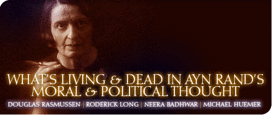Lead Essay
In this month’s lead essay, St. Johns University philosopher Douglas B. Rasmussen notes that Ayn Rand is all the rage. But why not Hayek or other free-market thinkers? Why Rand? Rasmussen submits that it comes down to “her ability to note with dramatic force the immorality and hypocrisy of our current political age; her commitment to individual rights; her holding liberty and capitalism inviolate; her rejection of ‘moral cannibalism’ in any form; her advocacy of moral individualism; her recognition of a moral order grounded in human nature; and her realization that reality is not only intelligible but open to possibilities for human achievement far more wondrous than ever realized.” But is the philosophy underpinning this envigorating picture coherent? Rasmussen offers for discussion a series of tough questions, ranging from Rand’s account of individual rights to her views of religion.
Response Essays
In his reply to Rasmussen’s lead essay, Auburn University philosopher Roderick Long sets out to sort the wheat from the chaff in Ayn Rand’s moral and political thought. Long maintains that “Rand sets out to found a classical liberal conception of politics … upon a classical Greek conception of human nature and the human good,” and he goes on to defend the plausibility of this project. In particular, Long stands up for Rand’s reliance on a naturalistic teleology to ground her neo-Aristotlean ethic theory, pointing to contemporary philosophical work that supports Rand’s view. Long is less happy with Rand’s political thought and criticizes her ideas of the “pyramid of ability” and of big business as a “persecuted minority.” Long credits Rand for her trenchant analysis of corporatism, but argues that she was mistaken to deny that corporatism and capitalism go hand in hand. According to Long, Rand’s ideal of voluntary interaction not only implies a radical departure from historical capitalism, but also a more thoroughly anti-statist social order.
University of Colorado philosopher Michael Huemer takes up Douglas Rasmussen’s question of why there is such intense interest in Ayn Rand and answers that Rand, unlike Mises or Bastiat, “was not only a philosopher, but a compelling novelist.” However gripping her novels, Huemer is not impressed with Rand’s moral philosophy. “The theory of ‘The Objectivist Ethics’,” Huemer writes, “is simultaneously the most distinctive and the least plausible, worst defended of all of Rand’s major ideas.” Huemer argues that there is a glaring conflict between Rand’s ethical egoism and her case for individual rights: “I cannot hold my own well-being as the only end in itself, and simultaneously say that I recognize other persons as ends in themselves too.” Huemer recommends discarding Rand’s egoism and setting her ban of the initiation of force and fraud on a more plausible foundation.
University of Oklahoma philosopher Neera K. Badhwar attributes the ongoing currency of Ayn Rand’s ideas to the persisting appeal of her novels. “In Rand’s fiction,” Badhwar writes, “we witness the tragedy of Prometheus bound and the triumph of Prometheus unbound. No purely theoretical work can show this.” When it comes to Rand’s theoretical work, Badhwar’s assessment is mixed. She notes that Rand’s ethical theory presents both long-term biological survival and survival “as a rational, and thus, viruous being” as the standard of moral action. However, Badhwar argues, “there is no coherent way to show that to survive long-term is to survive qua man is to achieve eudaimonia.” Rand depicts virtue in her fiction “as a shield against misery even in the worst of misfortunes,” and vice “as causing psychological turmoil.” But, Badhwar observes, virtue doesn’t always pay and vice doesn’t always exact a terrible price. Badhwar also disputes Rand’s belief in the unity of the virtues and the possibility of moral perfection and argues that “virtues such as kindness, charity, and forgiveness are much more important in human life than Rand grants.” Last, Badhwar takes up Rand’s idea that “the creator should not pander to debased or immoral desires,” and suggests a more moderate version of this view.
The Conversation
Related at Cato
» Book Forum: The Life and Impact of Ayn Rand, October 28, 2009, featuring Anne C. Heller and Jennifer Burns
» Article: Three Women Who Launched a Movement: Rose Wilder Lane, Isabel Patterson,and Ayn Rand
» Article: Ayn Rand at 100 by Brian Doherty, Cato Policy Report, March/April 2005

